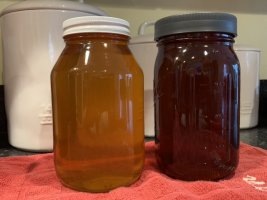Todd Peterson
Well-Known Member
Good afternoon. New board member with a request for some input.
It has been a while since I have attempted a batch of mead. I have dusted off my equipment and mead making resources with the expectation of picking the hobby back up again.
I keep bees as well as I make mead. In spite of myself, we have experienced several years of good honey harvest.
Anyone that has let gallons of honey sit around for a long period of time has experienced crystallization. I have de crystallized some of my older honey with the intention of making mead with honey from my beehives. The nectar source is comprised primarily of clover, tulip poplar, and other wildflowers.
The honey that I intend to use is really dark. Partially attributed to age and partially attributed to the heat exposure needed to de crystallize a gallon jug of solid honey. Free tip, if you are going to keep honey for an extended period of time, glass quart jars are your friend.
I am looking to use Curt Stock’s super berry melomel recipe for my first batch back into the hobby.
Based on the experience of the group, will a darker mead with a pronounced honey taste pair well with the berry mix for the mead?
If not, what would you do with gallons of this dark honey?
The quart on the left is the typical color of my wildflower honey. The quart on the right is the goodness in question.
Looking forward to your feedback. Thanks in advance for the help.
It has been a while since I have attempted a batch of mead. I have dusted off my equipment and mead making resources with the expectation of picking the hobby back up again.
I keep bees as well as I make mead. In spite of myself, we have experienced several years of good honey harvest.
Anyone that has let gallons of honey sit around for a long period of time has experienced crystallization. I have de crystallized some of my older honey with the intention of making mead with honey from my beehives. The nectar source is comprised primarily of clover, tulip poplar, and other wildflowers.
The honey that I intend to use is really dark. Partially attributed to age and partially attributed to the heat exposure needed to de crystallize a gallon jug of solid honey. Free tip, if you are going to keep honey for an extended period of time, glass quart jars are your friend.
I am looking to use Curt Stock’s super berry melomel recipe for my first batch back into the hobby.
Based on the experience of the group, will a darker mead with a pronounced honey taste pair well with the berry mix for the mead?
If not, what would you do with gallons of this dark honey?
The quart on the left is the typical color of my wildflower honey. The quart on the right is the goodness in question.
Looking forward to your feedback. Thanks in advance for the help.




































![Craft A Brew - Safale S-04 Dry Yeast - Fermentis - English Ale Dry Yeast - For English and American Ales and Hard Apple Ciders - Ingredients for Home Brewing - Beer Making Supplies - [1 Pack]](https://m.media-amazon.com/images/I/41fVGNh6JfL._SL500_.jpg)










